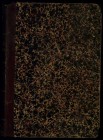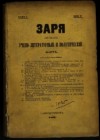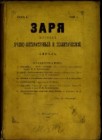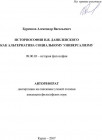Nikolai Danilevsky (1822-1885)

The collection is dedicated to Nikolai Danilevsky, a Russian philosopher, sociologist, biologist, ideologist of Pan-Slavism, and author of the seminal work "Russia and Europe". The collection includes his works, correspondence, research, journalistic materials, abstracts of his dissertations, and video lectures.
In the 1840s, Danilevsky became interested in socialist ideas and joined the circle of Mikhail Petrashevsky. He was arrested for his involvement with the group and spent more than four months in prison in the Peter and Paul fortress. After being exiled to Vologda and then Samara, he remained under police surveillance until 1856, during which time he shifted his political views towards conservatism.
N. Danilevsky became known for his work "Russia and Europe: A Look at the Cultural and Political Relations of the Slavic World to the German-Roman World" (published in Zarya magazine in 1869 and later published in a separate edition in 1871, and then reprinted several times). In this book, Danilevsky rejected the commonly accepted idea of a unified world history as an evolutionary process of a single human race, and proposed a new concept of "cultural-historical types" instead. He identified 13 such types in total, 10 of which went through exceptional stages from "birth" to "blossoming" and then decline. Danilevsky paid special attention to Romano-Germanic (European) and Slavic cultures. His civilizational approach influenced the ideas of later scholars such as Arnold Toynbee and Oswald Spengler.
An important part of the collection is taken up by Danilevsky's work in the fields of statistics, geography and ethnography. This includes "Report on the most well-established expedition to study fish and animal resources in the White and Arctic seas" and "Statistical studies on population distribution and movement in Russia in 1846". A special section presents the publications of Nikolai in the magazine Zarya, reflecting his views on the cultural and political relations between the Slavic and German-Roman worlds. The collection is complemented by N. N. Strakhov's letters to N. Danilevsky, reviews of his scientific activities by contemporaries, the text of P. N. Milyukov's public lecture "The Decomposition of Slavophilism: Danilevsky, Leontiev, and V. Solovyov", abstracts of modern research, and a video recording of the report "Apostle of Slavism: Nikolai Danilevsky, as well as his supporters and opponents».
When creating the collection, sources from the following institutions and holdings were used: the Russian State Library, the State Public Historical Library, the Library of the Russian Academy of Sciences, the Samara Regional Universal Scientific Library, the Ural Federal University, Herzen Russian State Pedagogical University, Krupskaya Moscow Regional State Scientific Library and the portals of Lomonosov Moscow State University and Tsiolkovsky Kaluga State University.
- Life and work
Russian Bulletin.1901. T. 271. [№ 1].January
Russian Bulletin.1901. T. 271. [№ 1].January.1901.Russian bulletin. 1901. T. 272. [No. 3-4]. March, April
Russian bulletin. Moscow: the publication of M. Katkov, 1856-1906.
1901. T. 272. [No. 3-4]. March, April. 1901.Letter from N.N. Strakhov to N.Ya. Danilevsky: XXII-XXX / Reported by I.P. Matchenko. S. S. 125-141 (scans 135-151)
Nikolay Yakovlevich Danilevsky
Semenov, Petr Nikolaevich (1858-). Nikolai Yakovlevich Danilevsky. St. Petersburg: type. A.S. Suvorin, 1885. - Essay
The Caucasus and its mountain inhabitants in their current situation
Danilevsky, Nikolai Yakovlevich (1822-1885). The Caucasus and its mountain inhabitants in their current situation. Moscow: at the University Press, 1846.Statistical Studies on the Distribution and Movement of Population in Russia in 1846
Danilevsky, Nikolai Yakovlevich (1822-1885). Statistical studies on the distribution and movement of population in Russia in 1846. St. Petersburg: printing house of the Ministry of Internal Affairs, 1851.Report of the Highest Establishing Expedition for the study of fish and animal fishing on white and the Arctic Seas, in 1859
Danilevsky, N. Report of the Highest Estimated Expedition for the study of fish and animal crafts on the white and Arctic Seas, in 1859.St. Petersburg: Type.Leonid Demis, 1860.Several thoughts about Russian geographical terminology
Danilevsky, N. Ya. Slick of thoughts about Russian geographical terminology.[B.M .: B.I., 19--].Collection of articles read at the Department of Russian Language and Literature of the Imperial Academy of Sciences. T. 7, No. 3. Addition to the Experience of the Regional Great Russian Dictionary
Academy of Sciences (St. Petersburg). Branch of the Russian language and literature. Collection of articles read at the Department of Russian Language and Literature of the Imperial Academy of Sciences. St.Petersburg: printing house of the Imperial Academy of Sciences, 1867-1870.
T. 7, No. 3: Supplement to the Experience of the Regional Great Russian Dictionary. 1869.Darwinism.T. 1. PH. 2
Danilevsky.N.Ya. Darwinism.T. 1. PH. 2. 1885.Russian bulletin. 1887. T. 189. [№ 5]. May
Russian bulletin.
1887. T. 189. [No. 5]. May. 1887.Danilevsky N.Ya. Expression of feelings by humans and animals: pp. 5-54 (scans 11-60)
Доступно только в Электронных читальных залахRussian bulletin. 1887. T. 189. [No. 6]. June
Russian bulletin.
1887. T. 189. [No. 6]. June. [1887].Danilevsky N.Ya. Expression of feelings by humans and animals: End. pp. 493-534 (scans 7-48)
Доступно только в Электронных читальных залах- Russia and Europe: a look at the Cultural and Political relations between the Slavic world and the German-Romance world
Dawn.G. 1. 1869. [№ 1].January
Dawn.St. Petersburg, 1869.G. 1. 1869. [№ 1].January.1869.Danilevsky N.Ya. Russia and Europe. I–II. pp. 1-53 (scans 179-231)
Доступно только в Электронных читальных залахDawn.G. 1. 1869. February
Dawn.St. Petersburg, 1869.G. 1. 1869. February.1869.Danilevsky N.Ya. Russia and Europe. III–IV. pp. 51-91 (scans 221-261)
Доступно только в Электронных читальных залахDawn.G. 1. 1869. March
Dawn.St. Petersburg, 1869.G. 1. 1869. March.1869.Danilevsky N.Ya. Russia and Europe. V–VI. pp. 1-75 (scans 259-333)
Доступно только в Электронных читальных залахDawn.G. 1. 1869. April
Dawn.St. Petersburg, 1869.G. 1. 1869. April.1869.Danilevsky N.Ya. Russia and Europe. VII. pp. 93-103 (scans 267-277)
Доступно только в Электронных читальных залахDawn.G. 1. 1869. May
Dawn.St. Petersburg, 1869.G. 1. 1869. May.1869.Danilevsky N.Ya. Russia and Europe. VIII–IX. pp. 51-98 (scans 183-230)
Доступно только в Электронных читальных залахDawn.G. 1. 1869. July
Dawn.St. Petersburg, 1869.G. 1. 1869. July.1869.Danilevsky N.Ya. Russia and Europe. X–XI. pp. 20-101 (scans 162-243)
Доступно только в Электронных читальных залахDawn.G. 1. 1869. August
Dawn.St. Petersburg, 1869.G. 1. 1869. August.1869.Danilevsky N.Ya. Russia and Europe. XII–XIII. pp. 1-67 (scans 137-203)
Доступно только в Электронных читальных залахDawn.[1869.No. 9].September
Dawn.St. Petersburg, 1869.[1869.No. 9].September.1869.Danilevsky N.Ya. Russia and Europe. XIV–XV. pp. 1-67 (scans 121-187)
Доступно только в Электронных читальных залахDawn.G. 1. 1869. October
Dawn.St. Petersburg, 1869.G. 1. 1869. October.1869.Danilevsky N.Ya. Russia and Europe. XVI–XVII. pp. 54-130 (scans 132-208)
Доступно только в Электронных читальных залахRussia and Europe
Danilevsky, Nikolai Yakovlevich (1822-1885).Russia and Europe.St. Petersburg: ed.T-Va "societies. Use", 1871.Russia and Europe
Danilevsky, Nikolai Yakovlevich (1822-1885). Russia and Europe. St. Petersburg: The publication of N. Strakhov, 1888.Russia and Europe
Danilevsky, Nikolai Yakovlevich (1822-1885). Russia and Europe. St. Petersburg: The publication of N. Strakhov, 1895. - About the scientific heritage of N.Ya. Danilevsky
Dispute because of the books of N. Ya. Danilevsky // Russian Herald. T. 205, December 1889
Russian bulletin. Film Strakhov, Nikolai Nikolayevich (philosopher, 1828-1896). The dispute over the books of N. Ya. Danilevsky.News of the St. Petersburg Slavic Charitable Society. 1906. № 7. October
News of the St. Petersburg Slavic Charitable Society.
1906. № 7. October. 1906.Lobov L. P. N. Ya. Danilevsky and the modern turmoil. pp. 497-504 (scans 5-12)
Creativity N.Ya. Danilevsky in public thought postreform Russia
Khorosheva, Anna Vladimirovna Creativity N. Ya. Danilevsky in public thought postreform Russia. Moscow, 2007.Historiosophy N.Ya.Danilevsky as an alternative to social universalism
Bourenkov, Alexander.Historiosophy N.Ya.Danilevsky as an alternative to social universalism.Kursk, 2017.2019-12-10 Filmfond1
2019-12-10 Filmfond1.2023.































Letters from N.N. Strakhov to N.Ya. Danilevsky: I-VIII / Reported by I.P. Matchenko. pp. 127-142 (scans 137-152)